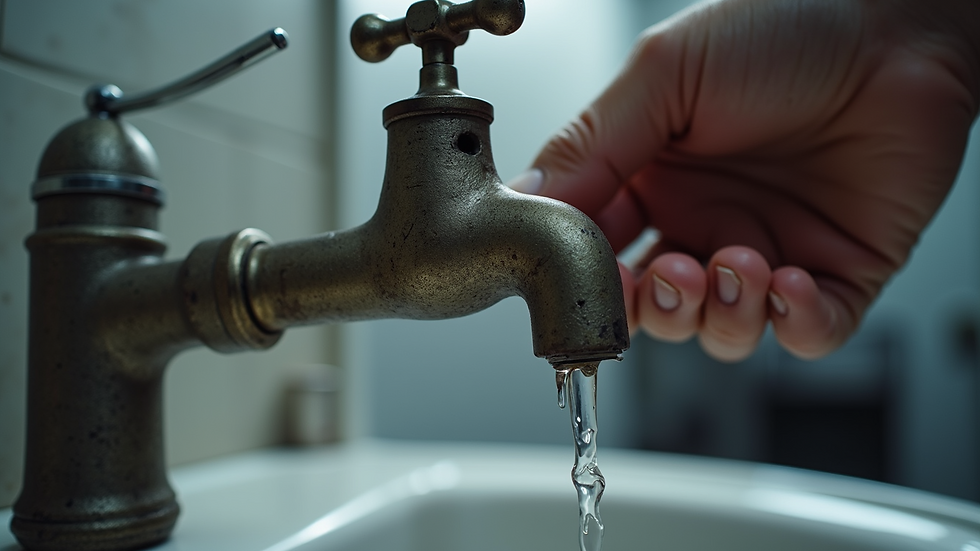Essential Repairs Every Homeowner Should Know About
- RICHARD OZO

- Oct 20
- 4 min read
Owning a home comes with the responsibility of maintaining it. Knowing the essential home repairs can save you time, money, and stress. Whether you are a new homeowner or have been living in your house for years, understanding these repairs helps keep your property safe and comfortable. This guide covers the most common repairs, practical tips, and when to call in professionals.
Common Home Repairs You Should Know About
Home repairs can range from simple fixes to more complex projects. Here are some of the most frequent repairs homeowners face:
1. Fixing Leaky Faucets and Pipes
A dripping faucet or leaking pipe is more than just annoying - it wastes water and can cause damage over time. To fix a leaky faucet:
Turn off the water supply.
Disassemble the faucet handle.
Replace worn-out washers or seals.
Reassemble and test for leaks.
For pipes, small leaks can sometimes be patched with plumber’s tape or epoxy putty, but larger leaks require pipe replacement.
2. Repairing Drywall Holes and Cracks
Walls can develop holes or cracks from accidents or settling. Repairing drywall is straightforward:
Clean the damaged area.
Use a patch or mesh tape for larger holes.
Apply joint compound in thin layers.
Sand smooth after drying.
Paint to match the wall.
3. Unclogging Drains and Toilets
Clogged drains are common and can often be fixed without a plumber:
Use a plunger for toilets and sinks.
Try a drain snake for stubborn clogs.
Avoid chemical drain cleaners as they can damage pipes.
4. Replacing Broken Tiles
Cracked or broken tiles in kitchens and bathrooms not only look bad but can cause water damage:
Remove the damaged tile carefully.
Clean the area and apply new adhesive.
Place the new tile and grout around it.
5. Maintaining HVAC Systems
Regular maintenance of heating and cooling systems improves efficiency and prevents breakdowns:
Change filters every 1-3 months.
Clean vents and ducts.
Schedule professional inspections annually.

Why Understanding Home Repairs Matters
Knowing how to handle basic home repairs empowers you to:
Save money by avoiding unnecessary service calls.
Prevent damage that could lead to costly renovations.
Increase home value by keeping everything in good condition.
Enhance safety by fixing hazards like faulty wiring or loose railings.
For example, a small roof leak left unattended can cause mold growth and structural damage. Fixing it early prevents these issues.
When to DIY and When to Call a Professional
Some repairs are simple and safe to do yourself, such as patching drywall or replacing a faucet washer. However, electrical work, major plumbing, or structural repairs should be handled by experts.
If you are unsure or uncomfortable, consider hiring handyman services to ensure the job is done correctly and safely.
What is a handyman allowed to do in the UK?
In the UK, handymen are versatile professionals who can perform a wide range of home repairs and maintenance tasks. However, there are legal limits to what they can do:
Permitted tasks: Painting, decorating, fixing doors and windows, minor plumbing repairs (like fixing leaks or replacing taps), carpentry, and general maintenance.
Restricted tasks: Electrical work involving wiring or fuse boxes, gas appliance repairs, and major structural changes require certified specialists.
Handymen provide a convenient solution for many small to medium repairs, saving homeowners time and effort. Always check their qualifications and insurance before hiring.

Essential Tools Every Homeowner Should Have
Having the right tools makes home repairs easier and more efficient. Here’s a basic toolkit every homeowner should keep:
Hammer
Screwdrivers (flathead and Phillips)
Adjustable wrench
Tape measure
Utility knife
Level
Pliers
Power drill with bits
Plunger
Flashlight
Investing in quality tools saves money in the long run and prepares you for unexpected repairs.
Tips for Using Tools Safely
Always wear safety goggles and gloves when necessary.
Read instructions before using power tools.
Keep tools organized and stored safely.
Use the right tool for the job to avoid damage or injury.
Preventative Maintenance to Avoid Costly Repairs
Regular maintenance is key to preventing major home repair issues. Here are some tips:
Inspect your roof twice a year for missing shingles or damage.
Clean gutters to prevent water damage.
Check for signs of pests and address infestations early.
Test smoke and carbon monoxide detectors monthly.
Seal gaps around windows and doors to improve energy efficiency.
By staying proactive, you can extend the life of your home’s components and avoid emergency repairs.

When to Seek Professional Help
While DIY repairs are satisfying and cost-effective, some situations require professional expertise:
Electrical problems beyond changing a light bulb.
Major plumbing issues like sewer backups.
Structural damage to walls or foundation.
HVAC system repairs or replacements.
Mold remediation.
Hiring professionals ensures safety and compliance with local building codes. If you need reliable assistance, consider trusted handyman services for many common repairs.
Taking Charge of Your Home’s Maintenance
Understanding essential home repairs equips you to keep your property in top shape. Start by learning simple fixes and building your toolkit. Schedule regular inspections and maintenance to catch problems early. When in doubt, don’t hesitate to call professionals who can help.
By staying informed and proactive, you protect your investment and enjoy a safe, comfortable home for years to come.




Comments